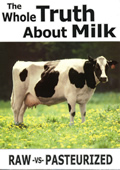THE TRUTH OF THE MATTER DOESN'T MATTER
By
Doreen Hannes
March 8, 2011
NewsWithViews.com
On February 26th, I received word that the verdict had come in on Morningland of the Ozarks court case. Late on Sunday night I received the documents. It took a little digesting, but one thing was clear straight out of the gate; if we want justice, we aren’t going to get it without a jury of our peers. Morningland was denied a jury trial.
Interestingly, in the section requesting that there be “Burden of Proof” to destroy the cheese, the judge finds that it’s unnecessary. He says, “judicial review probes only the lawfulness of an agency’s order without consideration of its reasonableness.” Further, he states, “The court finds no authority suggesting the State must prove defendant’s cheese unfit for human consumption...,” and also that the because of the “unsanitary surroundings” the “court must disregard the absence of sickness among consumers of defendant’s cheeses.” Reason, logic and actual illness and, evidently, due process are irrelevant if an agency decides to act against you.
The Charges
Morningland was charged with violating statute RSMo 196.545 by selling “Unlawful Dairy Products”. Here is that statute with the AG’s assertions in italics and the cites from the judge in bold:
Unlawful sale of dairy products.
196.545. It shall be unlawful to sell, offer or expose for sale, or deliver manufacturing milk or any dairy products made from manufacturing milk which:
(1) Are produced by animals afflicted with a contagious or infectious disease deleterious to man or detrimental to milk quality;
(2) Are not colostrum free or which have been taken from a cow fed or in contact with any substance that is unhealthful or that may produce unhealthful, impure or unwholesome milk;
(3) Are adulterated by the addition of any unauthorized substance including water or other material foreign to milk;
(4) Have been handled by any person afflicted with an infectious or contagious disease; or
(5) Are produced in unhealthy or unsanitary surroundings or held in unclean or unsanitary containers.
Since he used one cite that was actually brought up by the AG’s office, we’ll deal with that one first. Don Falls was the inspector for Morningland Dairy and came to the farmstead cheese plant once or twice a year to inspect the operation. Whenever an inspector inspects, they find something to put in their report. There is no perfect place and even the cleanest dairies I have ever seen get a mark up for “something” in any inspection. While Falls admitted that Morningland had made a lot of improvements on the property since the Dixons took over as General Managers, he cited their cheese harp (the thing that cuts the curds) as needing to be replaced. He also cited that there were areas of the concrete floor at doorways that needed to be painted. Even though a very thorough swabbing by the FDA, including the cheese harp and under the molding around the floors, revealed no listeria in the plant, the Judge found that Morningland’s Cheese was produced in “unsanitary surroundings”. So if you have older equipment, it is likely to be deemed unsanitary in Missouri.
Now the second finding is really the most interesting. First of all, it wasn’t brought up by the AG’s office and secondly, the logic applied is astonishing. It follows the deductive reasoning of, “God is love and love is blind; Ray Charles is blind therefore Ray Charles is God.”
In that vein, here’s the break down of the judge’s evident logic. Morningland had one spike in SCC (somatic cell count) in one month out of twelve. The “dairy expert” testified that a spike indicates a herd health problem. Morningland sold cows. Therefore, the cows that were sold were diseased cows.
So, one spike plus one idiotic comment plus sold cows equals diseased cows.
Makes perfect sense, right?
Don’t Sell Cows if You Need Money
The testimony of Tim Wightman, the “dairy expert” brought in by Farm to Consumer Legal Defense Fund, was highly significant in the judge’s decision. Wightman has written a book and is working with many others to set National Raw Milk Standards that incorporate many of the ideals in his book. His testimony sometimes left the dairy farmers in the court audience with their heads shaking “no” and jaws hanging open in disbelief.
Prior to Wightman’s testimony, the AG cross-examined Denise Dixon and showed their intent to malign the Dixons for selling cows in late September. Remember Morningland had been shut down on August 26th and had to dump their milk for five and a half weeks awaiting the Missouri Milk Board’s okay to ship into the commercial milk chain. The AG asked Denise, “Why did you sell cows?” Denise replied, “We were financially stricken.”
They certainly were financially stricken. When you have dairy animals, they need to be tended. The Dixons had no income and all the continued expenses of running a dairy farm and a cheese plant (minus the employees) so they were forced to sell some dry cows to keep feeding their other cows. It happens every day. It’s a logical thing to do when faced with financial difficulties. It’s called cutting down on overhead.
Watch Out for Experts
Tim Wightman, the expert witness, testified that if there is an elevated SCC it is indicative of a potentially serious herd health problem. One spike in 12 months does not indicate a herd health problem. Two spikes in a row might very well be indicative of a problem, but one is a fluke and should be given all the intensive scrutiny reserved for an unlucky roll of the dice. Morningland’s SCC counts averaged in the 5-600k range, well below the State level of 750k, and the months following this spike were in line with their average.
Wightman’s standards are that SCC’s should always be under 300k, and no spikes are allowed. The problem with this is that we are talking about living animals with their own immune system, and both environmental and biological stresses can elevate SCC’s. 300k is a good ideal and should probably be pursued, but despite Mr. Wightman’s belief, it is not a requirement for good raw dairy. Testifying in court that your book’s statement of “no milk with an SCC higher than 300k should be used for raw dairy” is accurate is simply dishonest, and has proven to be fatal to Morningland Dairy.
The most stunning thing about Wightman’s testimony was when the Attorney General’s Counsel asked if selling cows would reduce the somatic cell count and he replied, “Yes.”
This was when the dairy farmers jaws were dropping. Mine included.
Really, Tim? Selling cows reduces the SCC? No qualifications in the equation? Selling cows reduces the SCC? Dry cows? Really?
Based on this statement of the “dairy expert”, the judge has ruled that Morningland had diseased cows in their herd and sold them to avoid detection. Those dry cows were obviously the source of contamination that led to Morningland’s problems. Never mind that they exhibited no symptoms, testing or proof, and no one became ill. Evidence is unnecessary.
Nice.
Do we really want these “National Raw Milk Standards”? Who will benefit?
Now Judges Regulate from the Bench
In the Final Order of Permanent Injunction, the judge prescribes what Morningland Dairy is to do if they desire to enter into commerce in cheese ever again. Oddly enough, the judge’s prescriptions are taken directly from a conversation with a noted cheese consultant that occurred in the presence of Don Falls of the Missouri Milk Board and myself. Almost verbatim.
Despite the judge’s admission in the Judgment that it would be unreasonable to ask the Milk Board to test each batch of cheese before destroying it, he requires that Morningland Dairy test each batch of cheese prior to offering it for sale. So the one’s with no investment don’t have to verify anything to destroy it, but those who have borne the cost and time to bring it to the point of sale must incur additional expense. Oh, and they must test the cheese prior to the 60th day of aging, as well.
Despite citing the fact that the FDA found no listeria in their swabbing, Morningland must foam ceilings, floors, equipment and all utensils with a listeria killing foam and install listeria killing foggers in their plant.
The judge also prescribes temperatures at which to age the cheese, and that cheeses in the process of aging must be in a separate cooler from those that have already aged. A commingling prohibition on cheeses in various stages of maturation is now ordered by a court.
Additionally, and most unreasonably, Morningland must “verify that no animal for use in the production of Defendant’s cheese is infected with mastitis”. How could this even be done? Prior to milking, a veterinarian with a microscope and all proper accoutrements must be present and each cow must be tested and wait to be milked until the vet has ascertained whether or not there is “mastitis” present.
Put simply, there is no way that anyone can make farmstead cheese under the conditions set forth by the judge in this ruling. But that’s been the desire of the Missouri Milk Board as agents of the FDA all along. They are doing just what the FDA wants them to do and the State of Missouri is acting in full agreement with the Federal agency which states “Raw dairy is inherently dangerous and should never be consumed by anyone, at any time, for any reason.”
Next Steps in this Case
The future of raw dairy in Missouri hangs on this case. While the judge acknowledged that he received the notice that Morningland has gone private and will not be engaging in commerce any longer thereby removing themselves from the jurisdiction of the Missouri Milk Board, he cites a statute that he claims disallows them from doing so.
The judge says that “to the extent that defendant purports an exemption of a new entity from regulatory requirements, the court notices RSMo 196.595 to the contrary...” So what does RSM0 196.595 say? “196.595. Beginning September 28, 1981, no person shall produce, sell, offer for sale or process milk or cream for the manufacture of human food except in accordance with the provisions of sections 196.520 to 196.610 and the regulations promulgated hereunder.”
If we don’t get this ruling overturned, or an amendment to this statute removing “person” from the control of the Milk Board, we can look forward to the Missouri Milk Board promulgating regulations regarding what you can do with your own milk in your own kitchen. Want to make some home-made mozzarella? You’ll have to follow all the regulations the Missouri Milk Board wants you to follow.
Despite FDA assertions, desires, requirements and fears, I will make cheese if I want to, and I will not ask for permission from any agency. I’m just kind of stubborn that way. If you look around this state I bet you’ll find a lot more very stubborn people.
| Subscribe to the NewsWithViews Daily News Alerts! |
There are supposed to be 30 days to make a Motion for Reconsideration that will likely be followed by an Appeal in this case. According to Pete Kennedy of the Farm to Consumer Legal Defense Fund it could take up to a year in the appeal process. By that time Morningland’s cheddar cheese ought to be sharp enough to cut through the bones of the Missouri Milk Board and the FDA. But the Milk Board has just informed the Dixons that they want to come in and destroy the cheese in their cooler on March 9th and 10th.
Who needs laws and procedures? Now we not only have no due process, we have no appeal, we have no system left in real food but tyranny.
� 2011 Doreen Hannes - All Rights Reserved











 Share
This Article
Share
This Article





